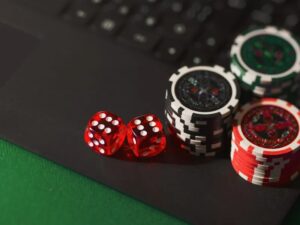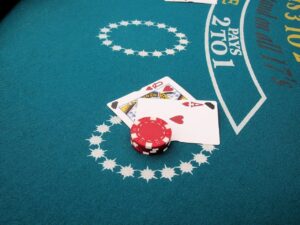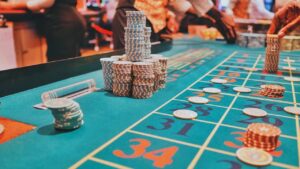How to play poker?

After receiving two down cards (hole cards) for their own hand in hold’em, players wager in a series. Failure, in which all three cards on the board are turned simultaneously, results in another wagering round. The following two load-up cards are dealt out one at a time, followed by a series of wagers on each one. Using the individual and board cards, a player can form any five-card combination he or she wishes. The board cards are local area cards. In fact, a player can “play the board” by combining all board cards and no private cards to form a hand. Vendor buttons are used. It is possible to play the game with one visually impaired person, multiple blinds, a bet, or a combination of blinds and a bet. This is despite the common design of having two blinds.
Betting rounds Opening arrangement: Each player is dealt two cards face up and they are called opening cards or pocket cards. These cards are used in games to win money.
Pocket Cards Card-back Card-back In the first round of wagering, each player can call the large visually impaired, raise, or crease, starting with the player to the side of the extremely visually impaired. The gigantic outwardly impeded has the right to raise an unraised pot.
The disappointment – The merchant uses a card, and later deals with three cards facing up. The underlying three cards are insinuated as lemons, while the neighborhood generally called the board with the intention of acquiring games to bring in cash.
Flop 3 J 9 Second round of wagering: Every player can check or wager, starting with the player to the left of the seller button. Once a bet has been made, each player can raise, call, or win.
The seller consumes another card on the turn and adds a fourth card to the local area cards, face up. With the introduction of games, this fourth card is called the turn card or the fourth road.
Flop 3 J 9 The Turn K Third round of wagering: Similar to the previous round, this round typically sees wagers of larger size in limited games.
The stream – The merchant consumes another card and adds a fifth and last card to the neighborhood. By playing games to earn money, this fifth card is known as the waterway card or the fifth road.
Flop 3 J The Turn The River A The final wagering round is organized similarly to the second and third adjustments.
The confrontation: The extra players show their hands using the most valuable five-card combination of their opening and local area cards, with the bettor or last raiser showing first. The pot is won by the best five-card hand. Should there be a tie, the pot is impartially divided among the victorious hands.)
Additional Rules for Texas Hold’em Poker These guidelines deal with anomalies. See Button and Visually Impaired Use in regards to that.
Upon revealing the first or second opening card to be uncovered. A misdeal results. The card is recovered, shuffled, and cut again by the vendor. If a different hole card is introduced due to a vendor botch, the plan continues. The exposed card cannot be kept. The seller then uses the uncovered card as the burn card after finishing the hand by replacing the card with the top card in the deck. If more than one opening card is revealed, this is a misdeal and there should be a redeal.
The lemon should be redealt if it contains so many cards. This holds true regardless of whether the additional card can be identified.)
The board cards are incorporated into the rest of the deck if the lemon needs to be redealt. This is because the cards were hurriedly floated before wagering was complete or the failure contained an excessive number of cards. The consumption card remains on the table. The seller cuts the deck after rearranging, arranges another failure without using a card, etc.
As soon as the dealer turns the fourth card on the board before the betting round is done, the card is eliminated from play for that round. This is whether or not the resulting players decide to wrinkle. The betting is then concluded. Instead of the fourth card, the vendor consumes and turns what could have been the fifth card. The vendor reshuffles the deck following this wagering round, including the card taken out of play but not copied or discarded. After that, the vendor splits the deck and turns in the final card without taking any cards. The deck is reshuffled and managed like a Poker app game if the fifth card is accidentally picked up.









